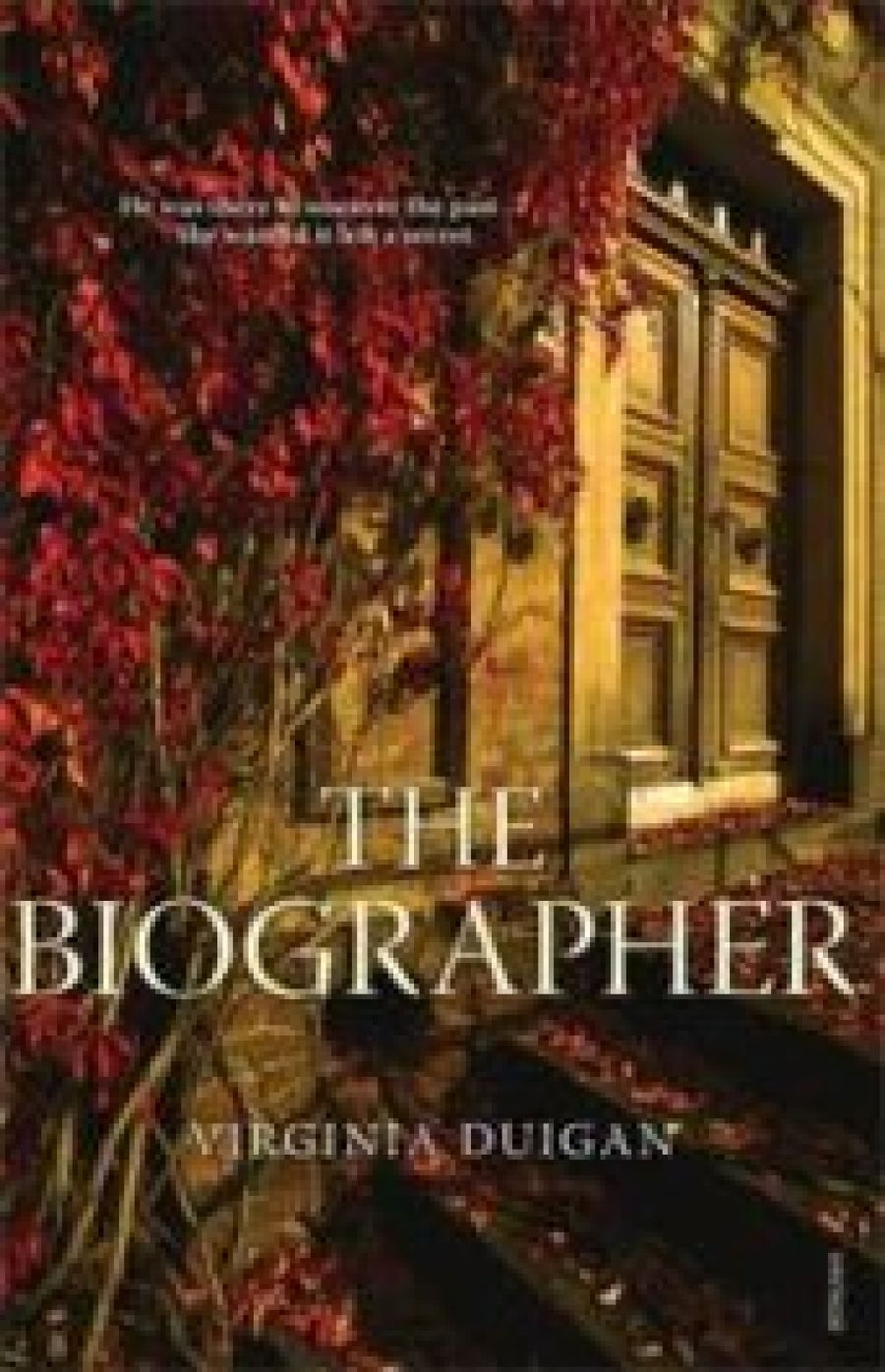
- Free Article: No
- Review Article: Yes
- Online Only: No
Borrowers might find only a small number of novels occupying the space, but one of them would surely be the enthralling City of your Final Destination (2002), written by American author Peter Cameron and soon to be filmed by Merchant-Ivory Productions; next in alphabetical order would be Virginia Duigan’s The Biographer, an Australian contribution. (I should perhaps make it clear that, despite some similarities, I am not suggesting any kind of undue influence, but rather some kind of global parthenogenesis.)
Extrapolating from these two examples, the human constituents of the new sub-genre would include a biographical subject, male and old enough to have already lived a very interesting life; his wife and/or mistress, harbouring brooding reservations about the projected biography; and two or three closely connected individuals, also with personal views, positive and negative, about the enterprise. This group forms an isolated enclave in or around an ancient dwelling in some exotic or beautiful setting (Uruguay for Cameron, Tuscany for Duigan). Then along comes the biographer himself, the outsider who stirs up the action. In the specified cases, the biographers are both masculine, but the male gender is not an absolute. Janet Malcolm would surely qualify for the non-fiction section of this shelf, given her fraught attempt to muster family cooperation for her book, The Silent Woman: Sylvia Plath and Ted Hughes (l994). All that is required is for the biographer to be seen as a menace, an intruder who will nose his way into locked cupboards and uncover secrets that should never meet the light of day. Such novels therefore begin with an argument about permission: to give or to withhold? For the sake of the oeuvre, however, vanity always vanquishes caution.
Duigan – who has worked as a journalist, broadcaster, editor and television scriptwriter, and is author of an earlier novel, Days Like These (2001), now to be republished – writes with professional skill and ease. Her vocabulary is adroitly chosen, her sentences beautifully balanced, her minor characters vividly sketched. Here, they include Mischa Svoboda, the biographical subject, famous artist, Czech national, and warm but single-minded bear of a man. Mischa and his partner, Melbourne-born Greer Gordan inhabit a small artists’ compound in the Tuscan hills. Once a castello, its old stone buildings now provide living quarters for residents and visitors, a couple of studios where the artists work, and a winery. This last is managed by Greer and Guy, a non-painting man and partner of the older artist, Rollo. Their pug-dogs, plus various hangers-on, add interest, charm, and local colour, as do the descriptions of landscape, changing seasons, vines, olives, food, wine, flower gardens and misty vistas.
The intrusive biographer, Tony Corbino, is a well-drawn, rather oily young American who knows how to placate. He is equipped with two tape recorders, one for the interviews and one for recording his own commentary on them. We thus learn through a kind of meta-discourse what the issues are for him; but Greer is the central character and the person with everything to fear from the biographer's probings. There are actually two secrets shaping the narrative: the first is the mystery clouding her past, which she absolutely does not want to revisit; the second is Tony's devious manner. Greer cannot establish, and is deeply worried about, how much Tony already knows, given that Monteleccio is not his first port of call; he has already done some snooping in Melbourne and Sydney.
Greer's qualms are confided directly and frequently but without obtaining much grip on the reader. There is a limit to the amount of concern and interest that can be generated in a story totally veiled by the subject's apprehension. It is not long before you become impatient with her well-modulated voice efficiently organising the day-to-day activities and fabric of the castello, plus the interaction between the various protagonists, while inwardly wallowing in an angst that dare not speak its name.
The disclosures in Greer’s 25-year-old diary, which she unwillingly forces herself to read, exhume the painful memories she has not explored for some time, but one does not have to be Miss Marple to make an approximate guess as to what they might involve. When the reader twigs, the interest moves from the what to the when, the how, and the what-happened-next. All of these are less obvious, allowing the novel to take off in the last twenty pages, when it suddenly gains the dramatic tension it has so far lacked and gives us a glimpse of fresh characters who are not mannered, picturesque or neurotic. It is a moot point whether the revelations make up for the earlier dragging pace and the fact that Greer is too repressive a woman to be very engaging; but that is not even the most interesting question to ask. As said, Duigan is a professional and experienced journalist who, according to her press release, worked in many spheres ‘before becoming a novelist’. Has she become a novelist? To do that, as distinct from writing novels and even getting them published, is a serious and ambitious aim, or claim, and somehow I feel that Duigan's very accomplishments have worked against it.


Comments powered by CComment